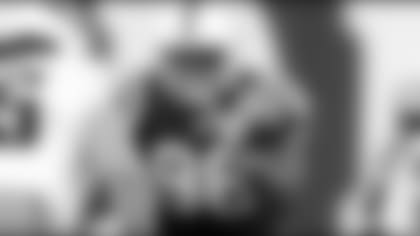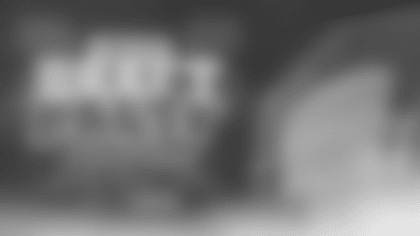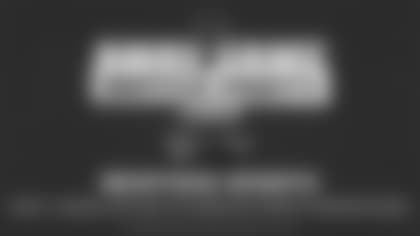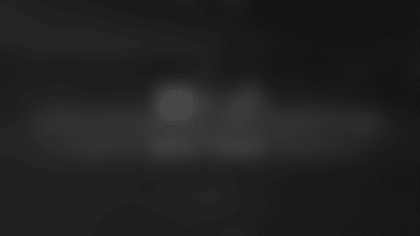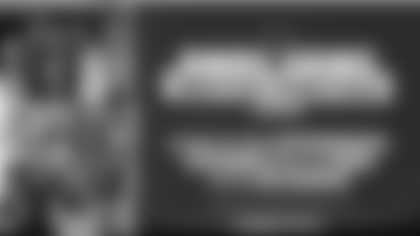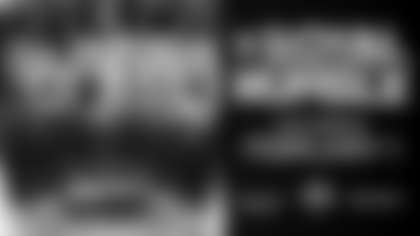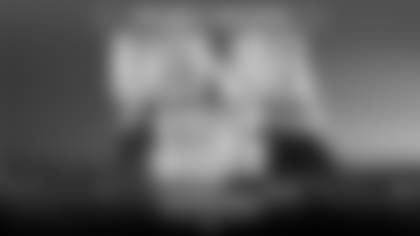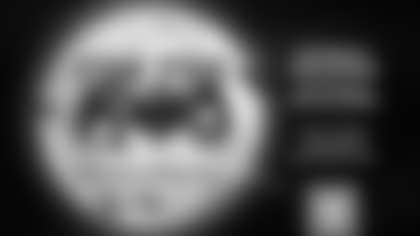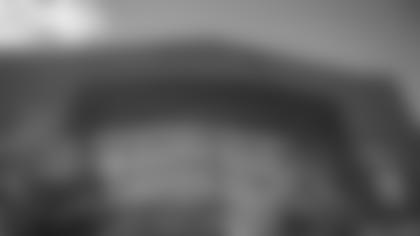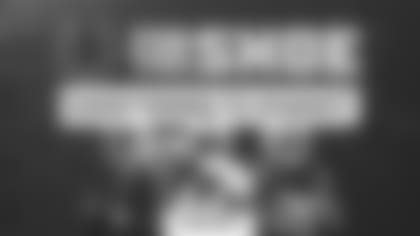Seventh of a Position-by-Position Series on the Colts' Roster
INDIANAPOLIS – When it comes to the defensive line – and the defense, period – Colts Head Coach Jim Caldwell said he agrees with the philosophy of his predecessor.
The philosophy:
That tackle is crucial to the success of the line, and the defense as a whole. As to what that means to the future of the Colts' defense at the tackle position, Caldwell said the specifics are uncertain. But Caldwell recently said that this much is clear:
The Colts will continue to prefer good players over big ones.
And that the core philosophy of the Colts' defense likely will be to put pressure on opposing quarterbacks.
"I think it's very imant," Caldwell said in an interview for this story on the team's defensive tackles, the latest in a position-by-position series scheduled to run on Colts.com this month.
"That's the center of your defense. It's a position where you have to make certain that you are able to hold up and hold up consistently."
And Caldwell said holding up and doing so consistently doesn't necessarily mean getting bigger.
The Colts since 2002 have run the Cover 2 defense, also known as the Tampa 2 or Dungy defense, so named for former Colts Head Coach Tony Dungy, who helped repopularize the scheme first as the head coach of the Tampa Bay Buccaneers and later as the Colts' head coach.
The Tampa 2 emphasizes speed and quickness on the defensive front because at the core of the defense's philosophy is an emphasis on pressuring the opposing quarterback.
As a result, teams that run the Tampa 2 often feature smaller defensive linemen, something that has been true of the Colts at times in recent seasons.
The Colts this offseason changed defensive coordinators, with Caldwell hiring Larry Coyer for the role. Coyer was the defensive coordinator for the Denver Broncos from 2003-2006 and spent the last two seasons with Tampa Bay, which was running the Tampa 2 defense at the time.
Coyer during his first meeting with Indianapolis media last month said this when asked about possible changes to the Colts' defensive scheme: "If we want to tweak something, we can do it. It comes back to communication and accountability. My whole job is to give our team the best chance we can give them to win. Whatever we need to do to do that, we're going to do."
Caldwell said of Coyer, "He's a very knowledgeable guy who has been in a multitude of systems and defensive schemes and techniques that he'll certainly be able to implement. We're not going to change from a schematic standpoint, but he'll certainly be able to help us develop in some areas where we need to get better."
The Colts last season were vastly different at tackle at the end of the season than at the beginning. Entering training camp, then-second-year players Ed Johnson, Quinn Pitcock and Keyunta Dawson formed a trio expected to play extensively at the position.
Pitcock retired unexpectedly at the outset of training camp, and Johnson was dismissed from the team following an off-field incident in September. Dawson started 12 games at right defensive tackle and two on the left, finishing the season with 71 tackles and three quarterback pressures.
"We have guys who can do both, who can stand up against the run, but then also rush the passer as well," Caldwell said. "Keyunta Dawson was kind of in that mode. He's a guy who played outside for us, and some inside as well. He's capable of being a real strong run stopper. He's a guy who certainly has been very effective. He's been very active. We like what we see from him."
With Pitcock and Johnson gone, several players played unexpectedly important roles on the interior, a group that included Eric Foster, a rookie from Rutgers who started 11 games at left tackle with 49 tackles last season. Foster finished the season with six quarterback pressures.
"Obviously, Eric Foster played for us inside and made plays for us," Caldwell said.
Antonio Johnson, a second-year veteran who signed with the Colts off Tennessee's practice squad on November 4, started four of the the the final eight games. Johnson, a fifth-round selection in the 2007 NFL Draft by the Titans, finished the season with 31 tackles and a quarterback pressure.
"Antonio Johnson did a nice job in there, and I think he's developing and coming along," Caldwell said. "He was able to certainly give us some strength to really make plays as well."
The Colts also last season acquired Dan Muir, a second-year tackle who spent his rookie season with the Green Bay Packers. He played in six games as a reserve last season and registered four tackles.
"We anticipate he should be able to help us as well," Caldwell said.
Because of last season's departures, defensive tackle has been targeted as a position of offseason need for the Colts by some observers, and it's a position the Colts have addressed in various ways in recent seasons. This past season, they traded with the Buffalo Bills to acquire tackle John McCargo, but he did not pass his physical.
"I don't believe in curses," Colts President Bill Polian said late last October. "I don't believe in positions that are cursed or stuff like that. It's just awfully bad luck and a string of it, but we'll fight our way through it and get the position better. The unfortunate part of it is you can't do it in a quantum leap during the regular season. . . .
"You just run into bad luck and the way to beat bad luck is to keep fighting. That's what we'll do at the position and any others where we feel it needs to be shorn up."
And while Caldwell said it's not yet known just how the position will be solidified, he said the philosophy of selecting good players over those who are just big won't likely change.
"The most important thing is that we get better," Caldwell said. "That's the key. I think sometimes there's a bit of a misconception about that. The key to it is that you want to have the ability that you can stop the run when need be, but the important thing is that at some point in time, to win the game teams are often going to drop back and pass. That's obviously where we want to make certain that we are strong.
"Pass rushers are very, very important, but we need to get better. I wouldn't always say we have to necessarily get, 'Bigger.' But we want to get better."


